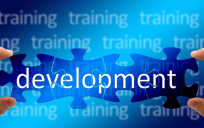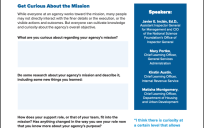Our voices are something that most of us probably take for granted, but they’re worthy of a great deal more consideration than we give them. Our voices say a lot about us, and, whether consciously or not, we infer a great deal from the voices of others.
With that in mind, taking some time to think about and develop your professional voice can have a big impact on your career and success.
During GovLoop’s recent NextGen online training, “How To Find Your Professional Voice,” speaking coach Casey Erin Clark took a deep dive into the realities of speaking in public — whether to an audience of one or 1,000. She also told listeners to do jumping jacks in the bathroom before their next public speaking engagement, and you can read on to find out why this is actually great advice.
The first point Clark made, which would have drawn an audible sigh of relief had her audience not been a virtual one, was that being nervous is OK, and that no one should feel any shame if they deal with stress or anxiety related to speaking in public. Nerves do not indicate that you’re doomed to be an ineffective or sub-par public speaker, she added. Everyone has something in them that will help them connect with an audience and get their point across.
“Your voice is as distinct as your fingerprint — it’s made up of everything that makes you you,” Clark said. This means that we all have our own equally valid and valuable roles to play in public discourse. If we want to play those roles to the best of our ability, then it’s helpful to understand how our voices work and how to ensure that we’re making them as effective as possible.
Clark encouraged listeners to think about their voices as having four parts, each with their own attendant areas for practice, awareness and refinement. Those four parts are physical, mental, emotional and social.
The physical aspect of your voice is perhaps the most obvious; it is the actual sound you make and the processes by which you make it. It is affected, of course, by many physiological factors that are beyond your control. But Clark focused on the importance of proper breathing and an awareness of how variables such as nerves or strong emotions affect the physical nature of your voice.
The mental aspect is all about what your voice is going to express, including your thoughts and ideas. Some people, Clark noted, might want to plan out exactly what they want to say or at least formulate it in their head before putting it into words. Others may find thinking out loud easier and more natural. There is no right or wrong way; it’s just important to think consciously about what works best for you and how you can set yourself up for success.
The emotional aspect of your voice can be attractive or unattractive, helpful or harmful, and the line between the two can be very fine. A voice shaking with anger may be off-putting, while a voice thundering in righteous conviction can captivate an audience. One need not hide their emotions, but it is important to recognize them, how they affect your voice and how to regulate them.
The final aspect of your voice is social. As Clark put it, every interaction you’ve been a part of, every interaction you’ve witnessed, and even what you’ve seen on TV or in the movies has had an impact on the development of the social aspect of our voice. Based on this, you make conscious and unconscious decisions about modulating your voice to either fit in or stand out.
Where we communicate can be just as important as how we communicate. Clark describes this as operating in “communication microsocieties,” which are essentially the different groups and environments that make up our lives.
“Nobody talks to their puppy the same way they talk to their boss,” said Clark, which is an easy-to-understand example that where we are and who we’re talking to necessarily impacts the communication strategies that we employ.
Regardless of the size of the audience, talking to others is public speaking, and that can make many people nervous. Remember the jumping jacks? This is where they come in.
“Don’t exercise to burn calories, exercise to burn stress,” Clark said. What she meant was that doing something physical is the best way to manage the physical reactions that come with nerves. In other words, if you’re feeling especially on edge before a meeting or a speech, head to the restroom and knock out a few jumping jacks.
Many of us may feel anxious when thinking about or preparing for public speaking, but by focusing on the factors we can control and understanding the mechanisms by which our voices share thoughts and ideas with others, we can become effective and confident communicators.
As Clark puts it, your voice, body and ideas deserve to take up space. Let them.
For more free content, career resources and training related to the 2020 NextGen Summit, be sure to check out our website, found here. GovLoop, Young Government Leaders and hundreds of public servants will come together on Wednesday, July 22-23, 2020, at the Marriott Marquis Downtown DC Hotel for two days of training and leadership opportunities, innovating and networking. Will we see you there?





Great recap Spencer! I appreciated her point to focus on what you CAN control when nerves are getting the best of you. Can’t wait for more content like these from NextGen.